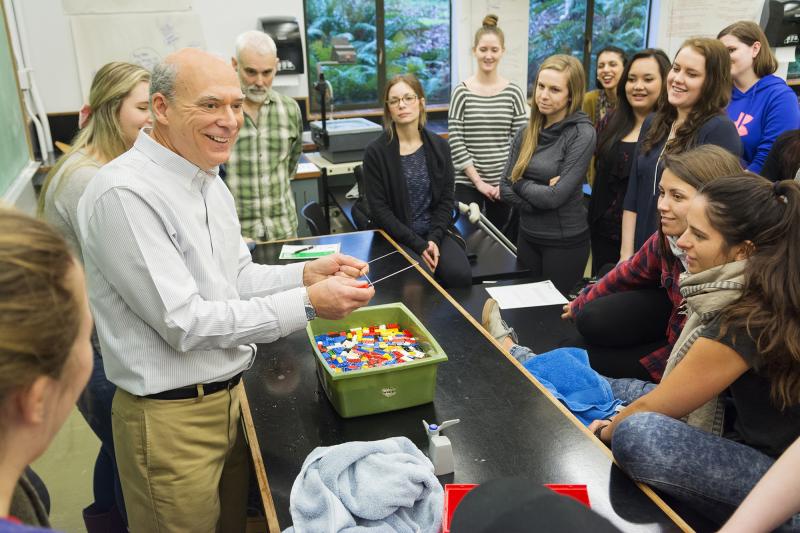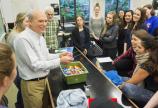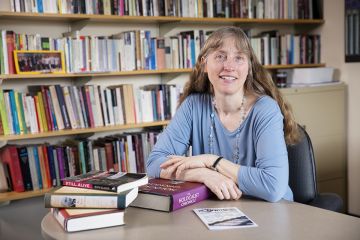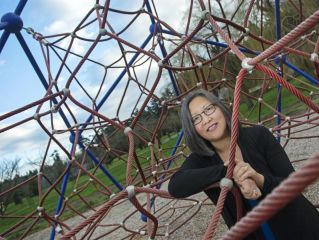Championing hands-on science education
- Suzanne Ahearne

UVic’s 11th 3M National Teaching Fellowship recipient drives tomorrow’s teachers to rethink curriculum and the student experience.
David Blades believes education is a political act and teachers need to be up front about that. “You’re always educating for something, toward something,” says the professor of science education and curriculum theory.
This month, Blades was awarded a 2016 3M National Teaching Fellowship in recognition of his exceptional teaching and education leadership at UVic, where he has taught since 2013, as well as at the University of Alberta and the University of Saskatchewan.
“Children are citizens from the moment they’re born,” Blades says “and as teachers, we need to ask, not only what will our children know when they graduate, but what do we want them to be as citizens?”
In his 37-year career as an educator, Blades has grounded a generation of teachers in educational philosophies of open, experimental, flexible and inquiry-based learning. He has advised the BC Ministry of Education and other governments across Canada about new, more relevant curricula based on experiential, authentic science that includes social justice, science literacy and community-focused teaching.
Embodying a theory
The professor of curriculum and instruction says in his own classrooms, he models the practices he advocates. When he teaches the history of curriculum theory he embodies an educational theory like a character actor inhabits a role. For example, in his class on Marxist and neo-Marxist curriculum theories, he walks into the classroom wearing a hat, work boots and jeans. He pounds the table and warns graduate students, mostly teachers, that schools are oppressive sites, turning children into efficient and submissive workers for the capitalist state. “It gives them a real feeling for the literature, and for the flaws in it,” he understates.
As he rounds a curve in his career, his research and teacher education is becoming increasingly focused on ethics and aesthetics.
“Beauty,” he says, “is the newest area of my research.” Asked if beauty can give students a deeper understanding of science, Blades says: “I’m not sure. That’s what I’m wondering. My hunch is that it may illuminate possibilities, but I don’t know yet. It feels like a very positive direction though.” …
Where wondering can lead
Weaving his research into his teaching, Blades recently introduced an experiment of his own into his UVic classroom. “If students were to study some aspect of nature,” he wondered, “really studied it, and depicted their journey of understanding from where they were to where they ended up through some form of artistic expression—a painting, a poem, a song, a play—would that affect our understanding of the nature of science?”
The result: in his assessment, about 80 percent of the students considerably deepened their understanding of the nature of science.
First, of course, he did the assignment himself. He studied snowflakes. Using the principles of scientific inquiry, he conducted multi-source research, and then wrote up his findings. When it came to depicting that aesthetically, he kept coming back to the idea of snowflakes as primarily water, and as fragile and beautiful and individual as human beings. Inspired by his research and his readings in ethics, he wrote a poem about the fragility of life. “My dad had just passed away at the time and I was in that space,” he says.
When it came to telling his class about the assignment and what he learned about snowflakes, he paused: “Am I going to share my poem with my students?”
“It became an incredible moment of teaching for me where I just became completely vulnerable in front of my students,” he recalls. Many students told him how his openness gave them the courage to do the assignment themselves. “Again, it’s modeling. If you’re going to ask them to be vulnerable, you need to be vulnerable first.”
Asked what it brings to the classroom when the teacher is vulnerable, he answers: “Humanness. It just brings a real humanity to the classroom.”
The influence of a master teacher
His students studied things like lightning, rivers, mountain geology, sea glass and shooting stars. Jayanna Barnes was part of the first Aesthetics Project experiment in her fourth year of the elementary teacher program at UVic. In her letter of support submitted as part of Blades’ application for the 3M fellowship, she says being part of it was a “defining moment” in her education. It encouraged her confidence, “ignited an internal drive to succeed” and led her to “engage in a higher order of thinking.”
Julie Lobb, now a French immersion teacher in the Saanich school district, refers to Blades as a “master teacher” and in her 3M letter she summed up Blades’ influence on her this way: “All of my teaching stems from the pedagogical model he introduced to us in class…. I demand that my students take risks in their learning and ask themselves the “why” and “to what end” of the material we cover; I celebrate all forms and levels of authentic curiosity and questioning; I practice humility and self-effacing warmth when communicating with parents, students in need, or administration; I try to be quick to listen and slow to speak and never hesitate to ask questions or seek mentorship when I’m in unfamiliar territory; I value collaborative thinking and love seeking out new ways to spark interest in science. …Most importantly, I’m cognizant of the things and people I love outside of the school community and try not to let the demands of my new career efface the demonstration of that love.”
Of the generation of teachers over whom he’s had such an influence, Blades says: “There’s such a positive attitude among them about what education can do. They seem on a mission and I find it thrilling to be with them.”
Blades is UVic’s 11th recipient to be awarded the 3M National Teaching Fellowship, which was established in 1986 through the generosity of 3M Canada and the Society for Teaching and Learning in Higher Education.
Past recipients include Prof. Jin-Sun Yoon (Child and Youth Care), 2015, Dr. A.R. (Elango) Elangovan (Gustavson School of Business), 2012, Dr. Gweneth Doane (Nursing), 2006, Prof. Jamie Cassels (Law), 2002, Dr. Marty Wall (Psychology), 2001, Dr. Aaron Devor (Sociology), 2000, Dr. David Berry (Chemistry), 2000, Dr. Thomas Cleary (English), 1994, Dr. Elizabeth Tumasonis (History in Art), 1992, Dr. Andy Farquharson (Social Work), 1986.
Photos
In this story
Keywords: 3M National Teaching Award, teaching, 3M, award, curriculum and instruction
People: David Blades



